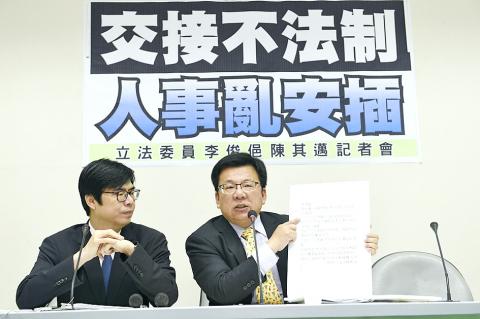Democratic Progressive Party (DPP) legislators yesterday rebutted allegations from Chinese Nationalist Party (KMT) caucus whip Lai Shyh-bao (賴士葆) that DPP legislation on the transition of presidential power is unconstitutional, adding that recent frequent shifts in government positions show that such a law is necessary.
Lai said that legislation to regulate what an outgoing president may do, which items should be transferred to the incoming president and the legal status of the incoming president might be unconstitutional, since it would put restrictions on the presidential power granted by the Constitution.
DPP legislators Lee Chun-yi (李俊俋) and Chen Chi-mai (陳其邁) yesterday disagreed.

Photo: George Tsorng, Taipei Times
“The reason why we need such legislation is that, after democratization, rotation of power has become usual, yet how the transition of power should proceed and what the outgoing president may or may not do are not regulated by any law,” Lee said. “In 2008, the KMT also proposed similar legislation, which would freeze the outgoing president’s power to sign treaties and agreements, as well as appointing officials.”
“If the KMT believes it is unconstitutional, why did it previously propose a bill that is almost identical to ours?” Lee said.
Chen said the Civil Functionaries Appointment Act (公務人員任用法) also restricts the power of elected officials to make appointments.
“According to the law, an outgoing elected official may not appoint new officials between the election day and the inauguration of the successor,” Chen said. “As the law does not apply to the president, what we are doing is filling in the loophole. If restricting presidential power is unconstitutional, why is the Civil Functionaries Appointment Act constitutional?”
Lee said that according to official statistics he obtained from the Executive Yuan’s Directorate-General of Personnel Administration, there had been frequent personnel appointments and transfers between July last year and Jan. 29.
“There have been cases where specially appointed officials were turned into public servants, which means these people would be protected by legal tenure, and the new government would not be able to do anything to them,” Lee said. “This is why we need an act to prevent such irregularities.”

A preclearance service to facilitate entry for people traveling to select airports in Japan would be available from Thursday next week to Feb. 25 at Taiwan Taoyuan International Airport, Taoyuan International Airport Corp (TIAC) said on Tuesday. The service was first made available to Taiwanese travelers throughout the winter vacation of 2024 and during the Lunar New Year holiday. In addition to flights to the Japanese cities of Hakodate, Asahikawa, Akita, Sendai, Niigata, Okayama, Takamatsu, Kumamoto and Kagoshima, the service would be available to travelers to Kobe and Oita. The service can be accessed by passengers of 15 flight routes operated by

Chinese spouse and influencer Guan Guan’s (關關) residency permit has been revoked for repeatedly posting pro-China videos that threaten national security, the National Immigration Agency confirmed today. Guan Guan has said many controversial statements in her videos posted to Douyin (抖音), including “the red flag will soon be painted all over Taiwan” and “Taiwan is an inseparable part of China,” and expressing hope for expedited reunification. The agency last year received multiple reports alleging that Guan Guan had advocated for armed reunification. After verifying the reports, the agency last month issued a notice requiring her to appear and explain her actions. Guan

GIVE AND TAKE: Blood demand continues to rise each year, while fewer young donors are available due to the nation’s falling birthrate, a doctor said Blood donors can redeem points earned from donations to obtain limited edition Formosan black bear travel mugs, the Kaohsiung Blood Center said yesterday, as it announced a goal of stocking 20,000 units of blood prior to the Lunar New Year. The last month of the lunar year is National Blood Donation Month, when local centers seek to stockpile blood for use during the Lunar New Year holiday. The blood demand in southern Taiwan — including Tainan and Kaohsiung, as well as Chiayi, Pingtung, Penghu and Taitung counties — is about 2,000 units per day, the center said. The donation campaign aims to boost

The Central Weather Administration (CWA) said a magnitude 4.9 earthquake that struck off the coast of eastern Taiwan yesterday was an independent event and part of a stress-adjustment process. The earthquake occurred at 4:47pm, with its epicenter at sea about 45.4km south of Yilan County Hall at a depth of 5.9km, the CWA said. The quake's intensity, which gauges the actual effects of a temblor, was highest in several townships in Yilan and neighboring Hualien County, where it measured 4 on Taiwan's seven-tier intensity scale, the CWA said. Lin Po-yu (林柏佑), a division chief at the CWA's Seismological Center, told a news conference